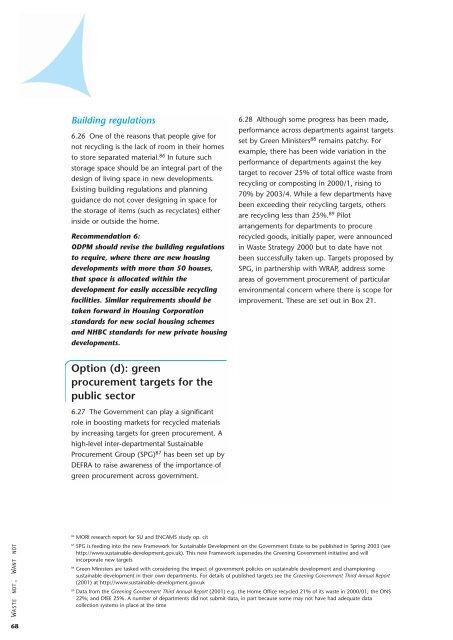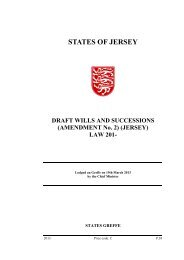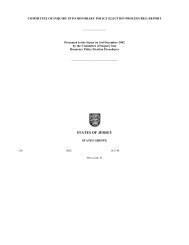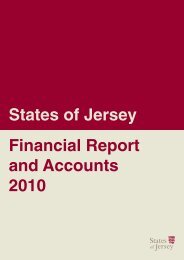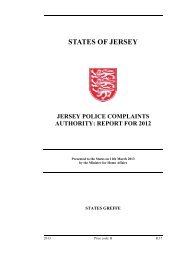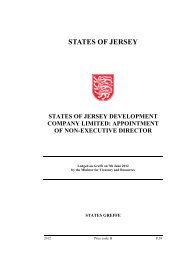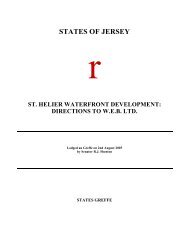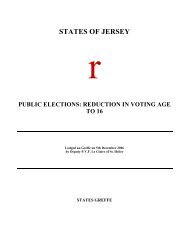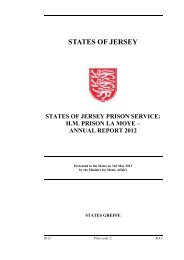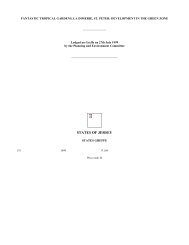Waste not want not - States Assembly
Waste not want not - States Assembly
Waste not want not - States Assembly
You also want an ePaper? Increase the reach of your titles
YUMPU automatically turns print PDFs into web optimized ePapers that Google loves.
Building regulations<br />
6.26 One of the reasons that people give for<br />
<strong>not</strong> recycling is the lack of room in their homes<br />
to store separated material. 86 In future such<br />
storage space should be an integral part of the<br />
design of living space in new developments.<br />
Existing building regulations and planning<br />
guidance do <strong>not</strong> cover designing in space for<br />
the storage of items (such as recyclates) either<br />
inside or outside the home.<br />
Recommendation 6:<br />
ODPM should revise the building regulations<br />
to require, where there are new housing<br />
developments with more than 50 houses,<br />
that space is allocated within the<br />
development for easily accessible recycling<br />
facilities. Similar requirements should be<br />
taken forward in Housing Corporation<br />
standards for new social housing schemes<br />
and NHBC standards for new private housing<br />
developments.<br />
6.28 Although some progress has been made,<br />
performance across departments against targets<br />
set by Green Ministers 88 remains patchy. For<br />
example, there has been wide variation in the<br />
performance of departments against the key<br />
target to recover 25% of total office waste from<br />
recycling or composting in 2000/1, rising to<br />
70% by 2003/4. While a few departments have<br />
been exceeding their recycling targets, others<br />
are recycling less than 25%. 89 Pilot<br />
arrangements for departments to procure<br />
recycled goods, initially paper, were announced<br />
in <strong>Waste</strong> Strategy 2000 but to date have <strong>not</strong><br />
been successfully taken up. Targets proposed by<br />
SPG, in partnership with WRAP, address some<br />
areas of government procurement of particular<br />
environmental concern where there is scope for<br />
improvement. These are set out in Box 21.<br />
Option (d): green<br />
procurement targets for the<br />
public sector<br />
6.27 The Government can play a significant<br />
role in boosting markets for recycled materials<br />
by increasing targets for green procurement. A<br />
high-level inter-departmental Sustainable<br />
Procurement Group (SPG) 87 has been set up by<br />
DEFRA to raise awareness of the importance of<br />
green procurement across government.<br />
86<br />
MORI research report for SU and ENCAMS study op. cit<br />
WASTE NOT, WANT NOT<br />
87<br />
SPG is feeding into the new Framework for Sustainable Development on the Government Estate to be published in Spring 2003 (see<br />
http://www.sustainable-development.gov.uk). This new Framework supersedes the Greening Government initiative and will<br />
incorporate new targets<br />
88<br />
Green Ministers are tasked with considering the impact of government policies on sustainable development and championing<br />
sustainable development in their own departments. For details of published targets see the Greening Government Third Annual Report<br />
(2001) at http://www.sustainable-development.gov.uk<br />
89<br />
Data from the Greening Government Third Annual Report (2001) e.g. the Home Office recycled 21% of its waste in 2000/01; the ONS<br />
22%; and DfEE 25%. A number of departments did <strong>not</strong> submit data, in part because some may <strong>not</strong> have had adequate data<br />
collection systems in place at the time<br />
68


